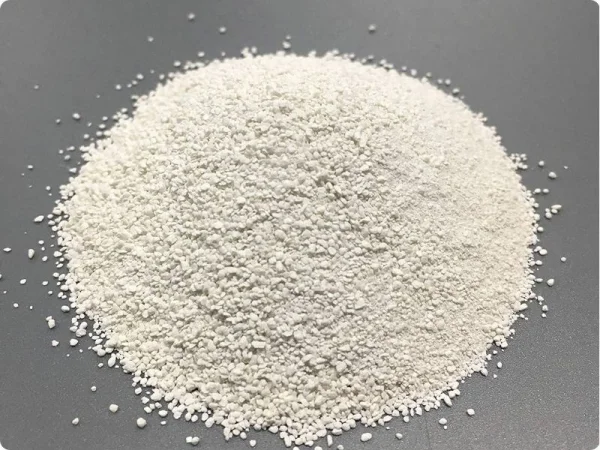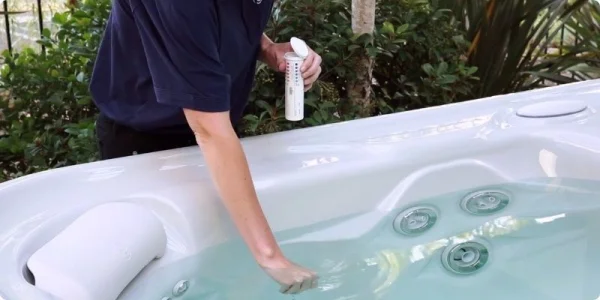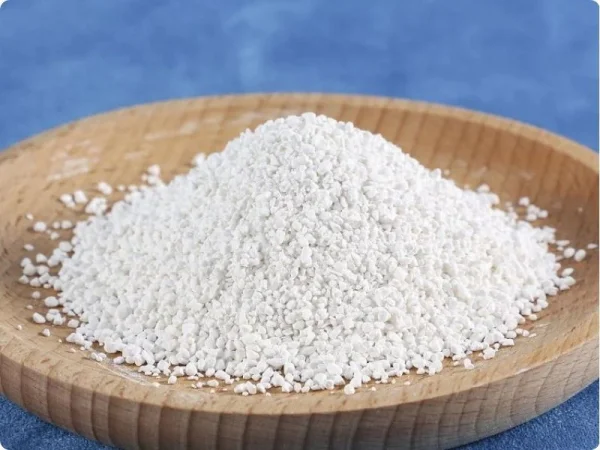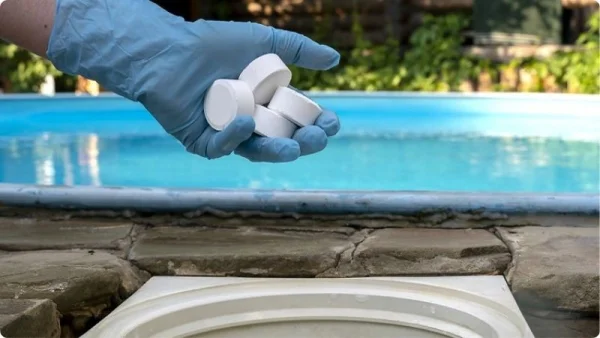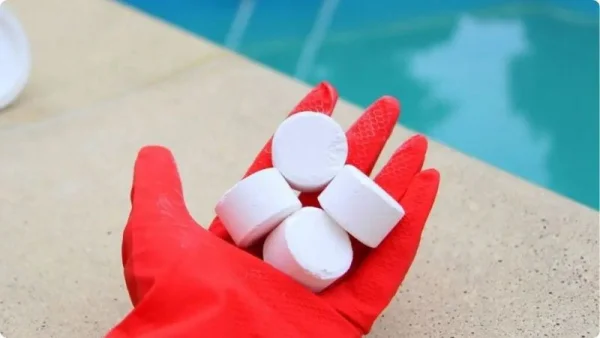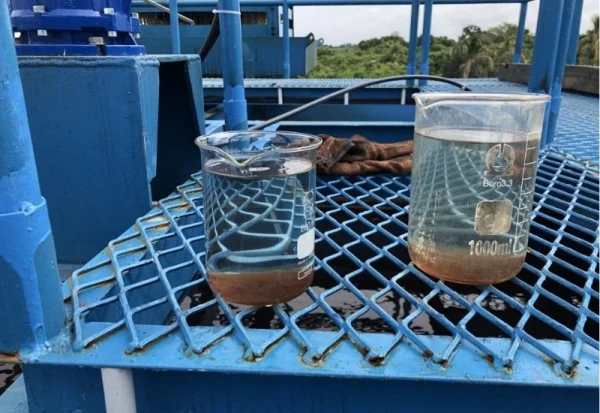
Water treatment and disinfection are essential for maintaining the safety and quality of our water supply. Chlorine Used in water treatment is one of the most commonly employed disinfectants because of its effectiveness and its ability to provide residual protection against the regrowth of pathogens. While methods such as ultraviolet and ozonation are also effective disinfectants, they do not offer the same residual effect as chlorination, which is particularly crucial when treatment plants are far from the point of use.
Different Types of Chlorine Utilized in Water Treatment
Chlorine used in water treatment typically comes in three forms: chlorine gas, calcium hypochlorite, and sodium hypochlorite. The selection among these options is usually based on factors such as cost, available storage facilities, and the necessary pH conditions.
Chlorine Gas
Chlorine gas is a greenish-yellow gas that is heavier than air and highly toxic, making it an excellent disinfectant for water but also a hazard to humans who handle it. Its high toxicity also makes it a deadly weapon when used in chemical warfare. Chlorine gas is a respiratory irritant and can irritate skin and mucous membranes, potentially causing death with sufficient exposure. Despite its toxicity, chlorine gas is no more toxic to humans when used to treat drinking water than other forms of chlorine due to the chemical changes that occur when introduced into water. Chlorine gas, sold as an amber-colored compressed liquid, is the least expensive form of chlorine and is therefore the preferred choice for municipal water systems.
Calcium Hypochlorite
Calcium hypochlorite is a white solid manufactured from chlorine gas. It is best known as chlorine pellets and granules in residential water treatment and has a very pungent odor. Calcium hypochlorite can create enough heat to explode, so it must not be stored near wood, cloth, or petroleum products. This form of chlorine increases the pH of the water being treated.
Sodium Hypochlorite
Sodium hypochlorite, commonly recognized as household bleach, is a light yellow liquid that contains chlorine. It has a relatively short shelf life but is the easiest to handle of all the types of chlorine. Sodium hypochlorite also raises the pH of the water being treated. A lower concentration of chlorine is needed in this form to treat water compared to calcium hypochlorite or chlorine gas.
Chlorine and pH Relationship
The effectiveness of chlorine as a disinfectant is directly related to the pH of the water. In general, the lower the pH, the more effective chlorine is as a disinfectant. This relationship is due to the two constituents of "free chlorine" – hypochlorous acid and hypochlorite ions. Hypochlorous acid is the more effective disinfectant, and it dominates at lower pH levels, making a lower pH preferable for disinfection. Conversely, water treatment strategies that rely on chlorination to oxidize iron and manganese require a higher pH.
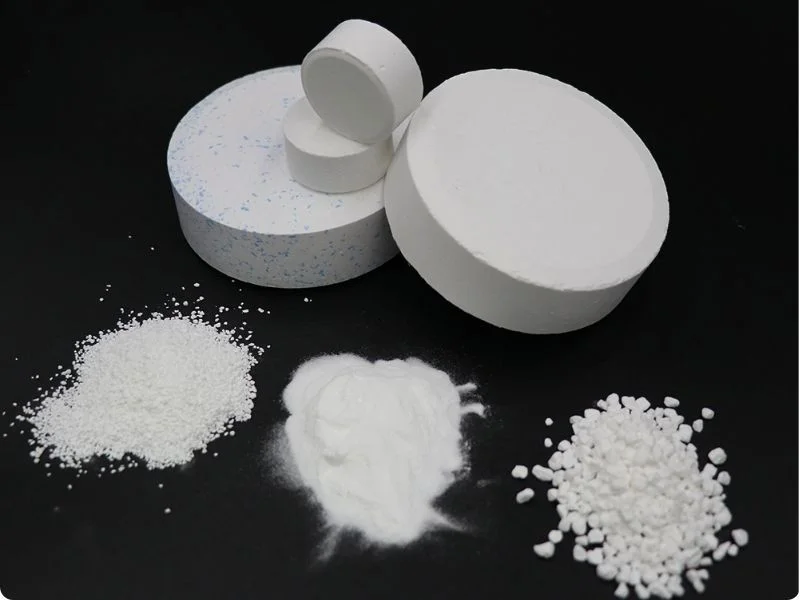
Different Types of Chlorine Utilized in Water Treatment
Applications of Chlorine Used in Water Treatment
Chlorine used in water treatment has several key applications, making it an indispensable chemical in this industry. Its primary use is for disinfection, but it also serves other important purposes, including:
Disinfection
Chlorine used in water treatment is most commonly for disinfection. As a disinfectant, chlorine has some drawbacks, but it also has advantages over other methods. Municipal water providers typically rely on measurements of "chlorine residual" – the amount of chlorine remaining in the water after it reaches its destination – as proof of safety. Residual requirements vary, but a typical residual goal would be 0.2 to 1 mg/L.
Oxidation
Beyond its primary disinfection capabilities, chlorine used in water treatment excels as an oxidizing agent. Its oxidation prowess allows it to effectively remove iron, manganese, and hydrogen sulfide from water sources. This oxidation process facilitates the removal of these contaminants, improving water quality. Moreover, chlorine oxidation helps reduce unwanted color in water supplies. It also aids crucial treatment processes like sedimentation and filtration by enhancing their efficiency through oxidation reactions.
Water Treatment for Pools and Industrial Systems
Chlorine is crucial for preserving the cleanliness and safety of swimming pools. Pool maintenance staff typically keep pools in a clean state by disinfecting them and maintaining chlorine levels in the water at 0.6 - 1 ppm, with a pH range of 7.2 - 7.6. Chlorine is also widely used in the treatment of industrial wastewater.
Aquaculture and Uses in Seafood
In aquaculture and seafood farming, chlorine has various applications and recommended dosages:
- Disinfection of equipment, tanks, and tools: Use 100-200 ppm for 30 minutes.
- Disinfection of pond bottoms: 50-100 ppm for pond bottom disinfection and 20-30 ppm for pond water.
- Treatment of parasitic diseases: 0.1-0.2 ppm.
- Treating of bacterial diseases: 1-3 ppm.
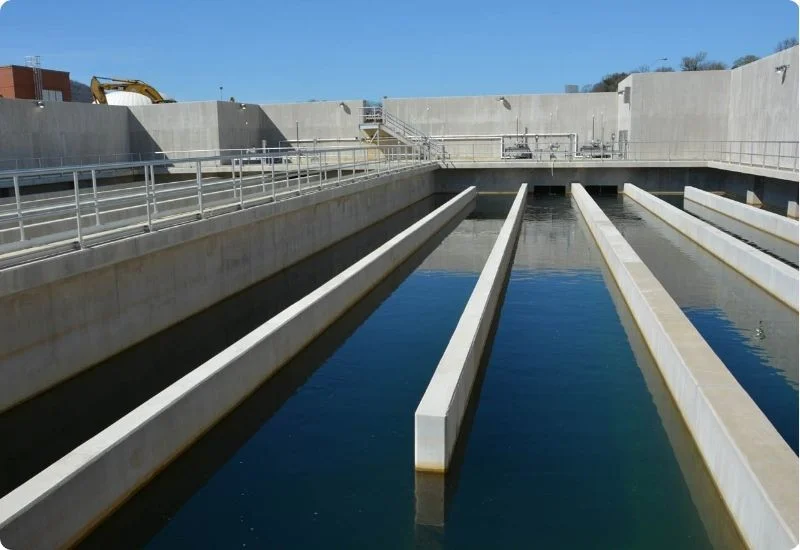
Applications of Chlorine Used in Water Treatment
Dong A Chemicals - Your Trusted Source for Chlorine
Selecting a reliable and reputable supplier of chlorine used in water treatment is a crucial factor that many people are concerned about these days. It provides people with the opportunity to use genuine, high-quality products from reputable and legally operating companies.
With 20 years of experience in the chemical industry, Dong A Chemicals can ensure the quality of its products when they reach the customers' hands. Additionally, the company offers various customer-friendly sales policies, making it a top destination for customers and businesses across the world who have a need for chlorine.
Contact Information:
- Hotline: (+84) 985977658
- Email: Tommy@dongachem.vn
- Website: dongachem.com
- Address: Khu 9, Phong Chau town, Phù Ninh district, Phu Tho, Viet Nam
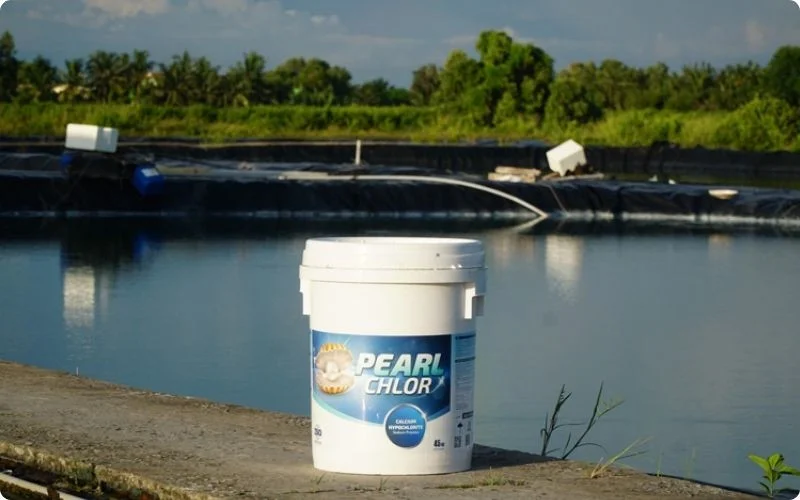
Dong A Chemicals - Your Trusted Source for Chlorine
Conclusion
Chlorine used in water treatment is a versatile and widely used chemical in water treatment processes, offering effective disinfection, oxidation, and cleaning capabilities. The three main types of chlorine used – chlorine gas, calcium hypochlorite, and sodium hypochlorite – each have their advantages and considerations. Proper dosage and pH control are crucial for achieving optimal results and ensuring safe water quality. If you require chlorine products for water treatment applications, it is advisable to consult with reliable suppliers and professionals who can provide guidance on appropriate usage and safety measures.
Related Articles
Everything You Need to Know About Chlorine Granules for Pool Sanitation
When it comes to maintaining a clean and hygienic swimming pool, chlorine granules , commonly known ...
Chlorine vs. Bromine: Which Sanitizer is Best for Your Pool?
Chlorine has long been the go-to sanitizer for pools and spas, but have you heard of its ...
Chlorine Granules vs Chlorine Tablets: Which is Better for Treating Water?
When it comes to treating water for swimming pools, industrial processes, or household uses, ...
Finding the Best Chlorine for Your Pool: A Comprehensive Guide
Chlorine is the backbone of pool sanitation, responsible for killing harmful bacteria, viruses, and ...
How Many Chlorine Tablets for Your Pool? A Step-by-Step Guide to Proper Dosage and Maintenance
One of the most crucial components in keeping your pool water crystal clear and free from harmful ...
How to Prepare PAC for Water Treatment?
Water is essential for life, yet access to clean and safe water remains a significant challenge ...

